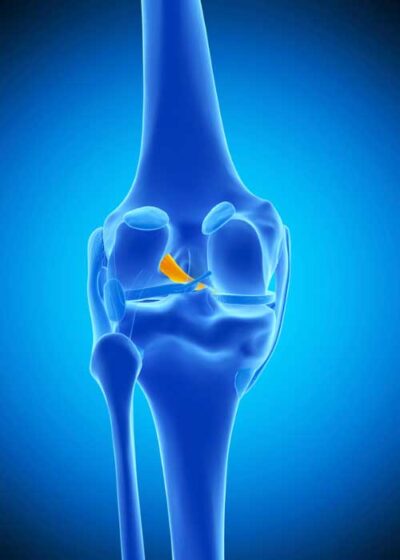Knee ACL Insufficiency Specialist

Are you an athlete who participates in sports that involve jumping or quick stopping? If so, you may be at risk of injuring your anterior cruciate ligament, or ACL. Injured anterior cruciate ligaments can cause pain, swelling and the feeling of an unstable knee. ACL insufficiency specialist, Doctor Riley J. Williams provides diagnosis as well as surgical and nonsurgical treatment options for patients in Manhattan, Brooklyn, New York City and surrounding areas who have sustained an ACL injury or who have knee instability. Contact Dr. Williams’ team today!
What is ACL insufficiency?
The anterior cruciate ligament (ACL) is an important ligament in the knee. Its function is to stabilize the knee while bending and rotating; the ACL also keeps the knee from shifting out of place or moving anteriorly (toward the front) with pivoting activities. The ACL prevents the knee from hyperextension (when the knee is bent backward). The ACL is an important ligament for activities that require cutting, kicking and jumping. Its elastic capabilities allow this ligament to stretch and return to normal length without incurring structural damage while playing sports and participating in other high demand activities. Injury to the ACL, such as a tear, can occur after a sudden change in direction quickly or following an awkward landing after a jump. When damage occurs to the anterior cruciate ligament, the knee becomes ACL insufficient. The ACL insufficient or deficient knee is characterized by an ACL that no longer performs the way it is intended. ACL deficiency can lead to further issues including knee collapse, anterior knee instability, meniscus injuries and arthritis. Some studies suggest that ACL injuries are more likely to occur in women than in men. Doctor Riley J. Williams, orthopedic knee specialist, serving Manhattan, Brooklyn, New York City, NY and surrounding areas, has extensive experience in treating ALC insufficiency, ACL tears, ACL deficiency, other issues related to anterior knee instability and knee instability injuries.
What is anterior knee instability?
Anterior means front or ventral, therefore, anterior knee instability refers to the knee that “feels” unstable at the front of the knee. Anterior knee instability can make typical activities of daily living and sports impossible to execute. These types of knees may give way, or not properly hold one’s weight. There may also be pain that is felt in the front of the knee with movement. Knee instability can occur after a torn or ruptured ACL. If the ACL is torn, patients who experience anterior knee instability may need to treat the injury with a brace, physical therapy, rest, ice, and NSAIDs (non-steroidal anti-inflammatory drugs).
What is knee instability?
The knee joint is susceptible to instability and injury because of it reliance on ligaments to provide support. Thus, when one or more the knee joint ligaments are injured, the knee may become unstable and move improperly out of joint during basic activities. Knee instability feels like the knee is moving too far from side-to-side, slipping too far anteriorly or posteriorly, or like it is twisting too far while doing a range of activities (i.e. walking, running, stairclimbing, sports). Knee instability can be the result of a torn or damaged ACL, PCL (posterior cruciate ligament), MCL (medial collateral ligament), or LCL (lateral collateral ligament). Knee instability can also stem from other injuries, such as a damaged meniscus or knee cartilage injury. Injuries to other knee structures can cause the knee to be weakened, making it easier for the ACL to be damaged.
What are the symptoms of ACL insufficiency?
Athletes and active individuals often suffer an ACL injury that in association with sporting activities. Sports that require a quick change of direction or landing poorly from a jump (soccer, football, lacrosse, downhill skiing etc.) may predispose participating individuals to ACL tears. Though less common, ACL insufficiency can also occur over time; repetitive minor injuries to the ACL can ultimately cause knee instability. The symptoms of ACL insufficiency can include:
- An audible “pop” at the time of injury
- Swelling within a few hours
- Severe pain
- Inability to bear weight
- Loss of range of motion
- The feeling of the knee “giving way”
How are ACL insufficiency and ACL tears diagnosed?
Dr. Williams will inquire about how the injury happened and make note of the patient’s gait and pain tolerance upon walking. He will also perform a physical examination on the knee to feel for fluid buildup, which can be a result of an ACL injury. Dr. Williams will also check for swelling. If there is considerable amount swelling and the patient is experiencing severe pain at the time of the assessment, Dr. Williams may suggest aspirating the knee. Knee aspiration can relief pain and make examination of the ACL deficient knee more accurate.
Dr. Williams will check the knee for ACL insufficiency using the Lachman test, the anterior drawer test and the pivot shift test. The Lachman test is the most accurate for detecting knee instability injuries. The patient will lie on his or her back while the doctor bends the knee to 20 to 30 degree flexed angle; the doctor then places his hands on the shinbone and thighbone and feels for whether or not the ACL is intact. An MRI scan will also be obtained to provide imaging of the injured knee. This will allow Dr. Williams to accurately diagnose the ACL injury and to determine if other ligament or knee structures have also been injured.
What are the treatment options for knee instability?
Non-surgical treatment:
When an injury to the ACL is sustained, non-surgical treatment may include:
- RICE: rest, ice, compression, elevation. This will help with pain and swelling.
- NSAIDs (non-steroidal anti-inflammatory drugs) such as ibuprofen or naproxen can also help alleviate pain and reduce swelling.
- Knee Brace to immobilize the knee
- Physical therapy can also help stabilize and strengthen the joint.
- Platelet rich plasma (PRP) and stem cell treatments may aid in the healing of a partial ACL tear. Conversely, there is no clear evidence that suggest such treatments will heal a fully ruptured ACL. Dr. Williams can discuss the effectiveness of biologics with the patients who may benefit from PRP or other stem cell treatments.
Surgical treatment:
Dr. Williams typically recommends surgery for patients with ACL tears and ACL insufficiency. Doctor Williams uses several factors, including activity level, age, patient’s health, and associated injuries, to determine a patient’s suitability for ACL reconstruction. Patients with multiple knee injuries can benefit from surgery to help eliminate anterior knee instability. ACL surgery may require reconstructing the ligament using tissue from the patient’s own body (autograft tissue) or from a donor (allograft tissue). In most all cases, ACL reconstruction is done as an out-patient; this means most patients will be able to go home the same day. Regional and/or local anesthesia is used for the ACL reconstruction. The surgery takes about an hour or less; all associated injuries are addressed at the time ACL surgery to ensure a complete functional recovery.
How long is the recovery after ACL insufficiency surgery?
Dr. Williams will recommend a personalized rehabilitation protocol that will begin immediately after surgery. Patients usually need two crutches for one week, and then one crutch the second week after surgery. Full weight bearing is allowed one week after surgery. Physical therapy typically begins 7-10 days after the procedure. Patients will be seen 1 week, 6 weeks, and 6 months following surgery. Most patients may return to normal activities of daily living 3-4 weeks after surgery. The full recovery takes six months as the ligament must mature to full strength over that time. After six months, full functionality is the norm, and athletes can resume regular sporting activities as long as they demonstrate a return of near normal strength to the ACL reconstructed knee.
For more information on ACL insufficiency and the treatment options available, please contact the office of Riley Williams, MD, orthopedic knee specialist serving Manhattan, Brooklyn, New York City, NY and surrounding areas.
Locations
610 W 58th Street
New York, NY 10019
148 39th Street, 7th Floor
Brooklyn, NY 11232



